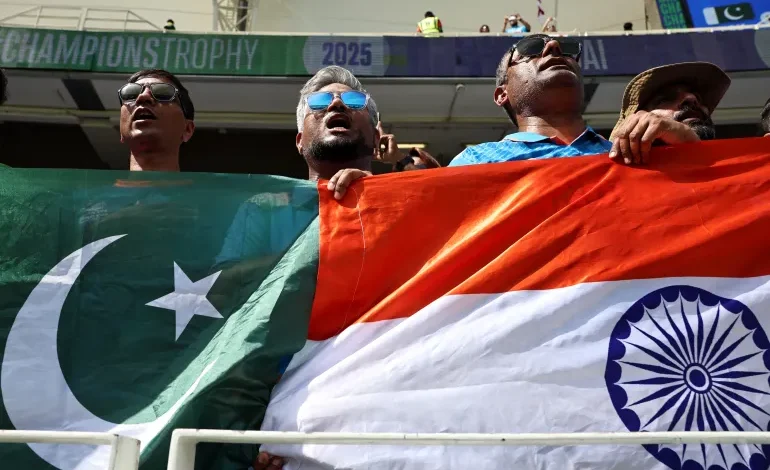
For the first time in years, an India vs Pakistan cricket match has not sold out completely. The keyword Asia Cup tickets dominated conversations as hundreds of seats remained available just hours before the high-profile clash in Dubai. Fans and experts linked the unusual situation to extreme heat in the Gulf and lingering political tensions between the two nations.
A Surprising Sight in Dubai
The Dubai International Cricket Stadium has historically witnessed full houses whenever the two South Asian rivals faced off. Yet, on Sunday morning, several sections of the ground still had unsold tickets. The official ticketing website showed availability in premium stands, pavilion sections, and even some high-priced hospitality areas.
Seats in the premium stand, priced at $205, and tickets in the east and west pavilion stands at $245 were available in dozens. Even hospitality packages costing as much as $1,645 each were not completely booked.
This scarcity of demand has left many surprised, especially as India-Pakistan matches often see tickets snapped up within hours of release.
Organizers Remain Silent
The Asian Cricket Council (ACC) and Emirates Cricket Board (ECB), responsible for organizing the Asia Cup, have not released any official statement. When approached for clarification, officials said ticket sales figures would be confirmed only after the match began.
This silence has added to speculation among fans, with many debating whether the issue lies more with weather conditions or political tensions.
Read: Terence Crawford Defeats Canelo Alvarez to Make History at Allegiant Stadium
Fans Cite Harsh Weather
Local residents in Dubai pointed to the September climate as a key deterrent. Shahid Khan, a Dubai-based cricket follower, explained the difficulty. “September is one of the hottest months here, with high temperatures and extreme humidity. Even evenings are uncomfortable,” he said.
At the scheduled start time of 6:30 pm, the forecast predicted 36C (95F) temperatures with 50 percent humidity. Khan added that while players are paid to endure such conditions, fans are expected to spend large sums of money only to sit in discomfort.
This weather reality, many argue, has discouraged families and casual spectators who would otherwise pack the stands.
Political Tensions Add to the Strain
Beyond the weather, experts also highlighted the impact of strained political relations between India and Pakistan. Only a few months ago, both nations faced an intense four-day border conflict in May. The fallout from that confrontation has seeped into sports, making some fans reluctant to attend.
Cricket between the two nations has always carried political undertones, but the recent conflict seems to have amplified divisions. Experts believe the atmosphere around this match lacks the celebratory tone that usually fuels ticket demand.
The Financial Burden
High ticket prices have also come under scrutiny. While passionate fans traditionally pay any amount to watch their teams, this year’s pricing strategy may have crossed a line. Paying over $200 for a seat in sweltering heat has discouraged many. Hospitality tickets, costing more than $1,600, further restricted access to the wealthiest spectators.
In past tournaments, tickets were snapped up quickly even at high prices. But with added challenges from the climate and strained relations, affordability became a major factor.
Fans Still Expect Intensity
Despite the unsold tickets, the match itself remains one of the most anticipated events in cricket. Both teams carry massive fan bases, and millions are expected to watch worldwide.
For fans in Dubai who do attend, the rivalry promises the usual intensity. India and Pakistan have a history of producing dramatic encounters in Asia Cups, World Cups, and bilateral tournaments. Players often describe the atmosphere as unlike any other, where national pride overshadows individual careers.
Global Attention Remains
While the stadium may not reach full capacity, the global audience ensures the match retains its status as one of the most-watched sporting events of the year. Television networks and digital platforms have recorded record pre-bookings, reflecting the rivalry’s enduring appeal beyond stadium attendance.
Analysts note that while physical turnout matters, the worldwide broadcast will still capture millions of passionate viewers. In many ways, the game has outgrown the confines of stadiums and exists as a global spectacle.
What This Means for Future Matches
The unsold tickets raise questions about future India-Pakistan fixtures in the Gulf. Organizers may need to rethink scheduling matches during the region’s hottest months or revisiting pricing strategies.
For now, the empty seats serve as a reminder that even the most storied rivalries are not immune to practical challenges like weather, economics, and geopolitics.
Still, the match will go ahead with all its weight of history, politics, and sporting pride. Fans across the world await the first ball, even if not all the seats in Dubai are filled.
Follow us on Instagram, YouTube, Facebook,, X and TikTok for latest updates
